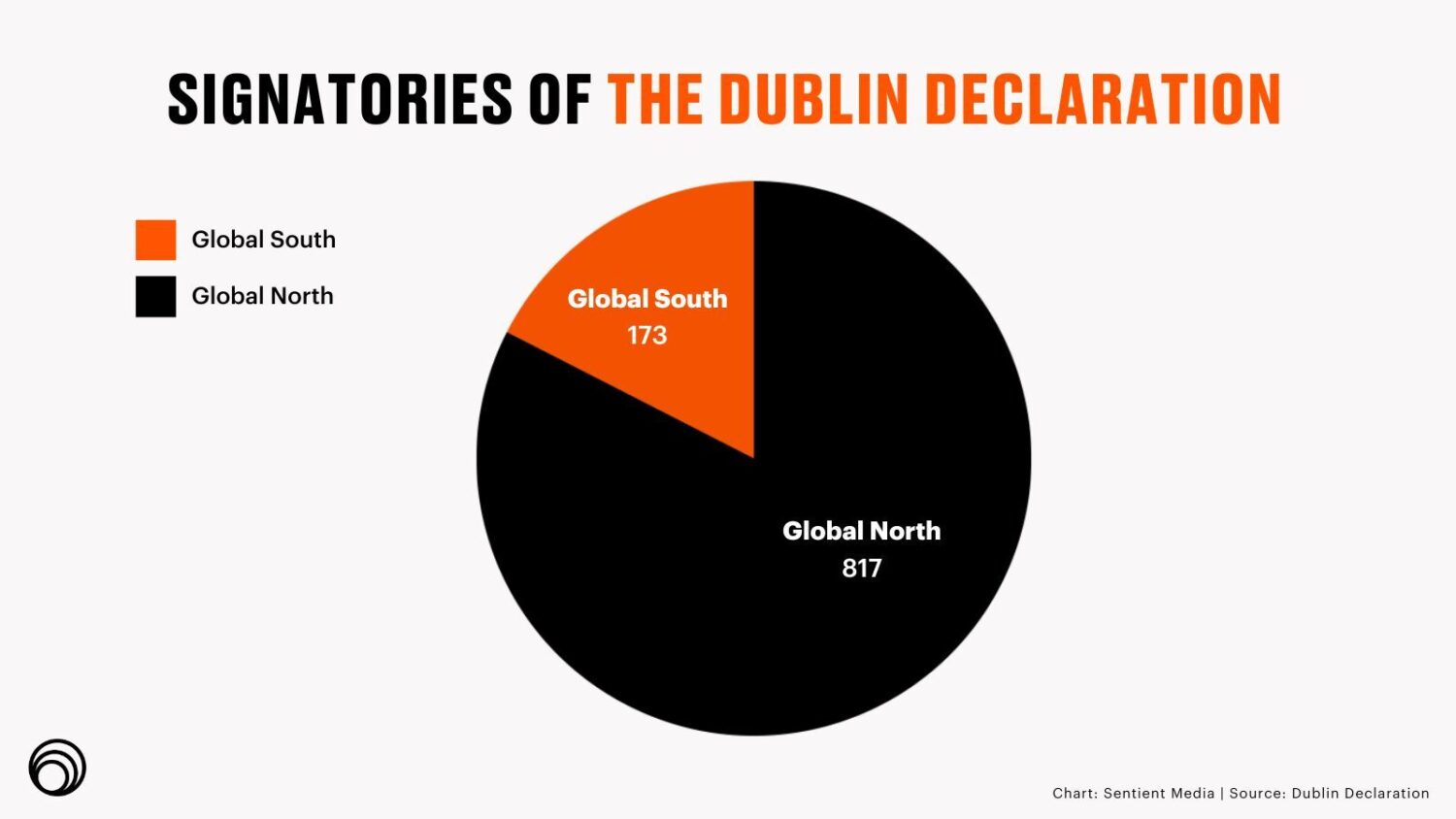Feature
The Sneaky Way Even Meat Lovers Can Lessen Their Climate Impact
Food•6 min read
Reported
The 1000 scientists who signed the declaration are far from impartial.


Words by Grace Hussain
Recent headlines report that scientists are changing their tune when it comes to the benefits of eating fewer animal products. The basis for such claims is a strident manifesto called The Dublin Declaration that flies in the face of decades of research and evidence.
The report’s opening comments end in an invitation for more scientists to show their support, calling animal agriculture “too precious to society to become the victim of simplification, reductionism or zealotry.” But we took a closer look at the signatories, and found close ties to the animal agriculture industry and an outsized number of scientists from the global north — the very countries that have been called on by climate experts to reduce their meat consumption.

At first glance, the 1000 scientists who signed the The Dublin Declaration have an impressive list of credentials after their names, but a closer look reveals intimate ties to the animal agriculture industry.
Most of the signatures are from people affiliated with animal agriculture in some way. Among them are Dr. Antoine Clinquart, Professor in a Food Science department and member of the board of the Belgian Association for Meat Science and Technology, and Pekka Huhtanen, visiting specialist in the animal nutrition group at the Natural Resources Institute of Finland.
The ties between signatories and animal agriculture don’t stop at research and academics. It’s likely many have at least some of their work directly funded by the industry. A recent exposé on Dr. Frank Mitloehner, who contributed his signature, revealed that industry funding for his projects reaches into the millions.
In addition to the academics at universities who have signed the declaration, a number of signatures have also come from people directly employed by industry. For example, 16 of the signees work with The Agriculture and Food Development Authority, an organization based out of Ireland that provides training and advice to the agriculture and food industries.
One of the most striking aspects of The Dublin Declaration is the countries from which these signatories hail. A handful of nations have more signatories than most: the United States (107), Spain (105) and France (77).
These three are also among countries in the global north with high rates of meat consumption — the very places researchers have called on to eat a lot less meat, yet also where animal agriculture is big business.
In 2022, the United States produced more beef than any other country. According to the USDA, since 2015, the sale of livestock, dairy and poultry products from producers has topped $160 billion annually, and prices that include significant markups passed onto consumers.
The story is similar for Spain, which is the EU’s second largest producer of livestock, with a herd of 26.5 million animals — making the industrial meat industry the country’s most active exporter. Primarily driving this trend is pork, exports of which have doubled in size over the last six years.
In 2022, the value of animal production in France totaled more than $34.5 billion. Much of that value stems from dairy, since France has the second largest dairy herd in the EU. In addition to milk products, the country also produces a larger amount of beef than any other member state.
The governments of these countries are setting aside considerable amounts of money to support the meat and dairy industries. This money goes to support research and development alike — which in the U.S. totaled $5.16 billion for agriculture as a whole in 2019 — as well as subsidies for farms. Globally, as of 2019, these subsidies amount to $1 million dollars a minute.
While it invites supporters to sign an abbreviated, online statement extolling the many virtues of meat, the manifesto takes the form of an entire issue of the Animal Frontiers journal. According to Matthew Hayek, PhD, associate Professor in Environmental Studies at New York University, the journal itself raises several red flags.
One of the most significant issues with Animal Frontiers is that its board is made up entirely of representatives from just five industry organizations: the American Society of Animal Science; the Canadian Society of Animal Science; the European Federation of Animal Science; the World Association of Animal Production and the American Meat Science Association. The lack of board diversity raises suspicion that the journal is produced in an echo chamber in which all stakeholders share the same perspective when it comes to animal agriculture.
The journal also only accepts submissions by invitation. Per their own submission guidelines, “unsolicited submissions will not be considered.” As Dr. Hayek pointed out on Twitter, “industry collaboration can be fine, but the field is not accumulating independent, empirical evidence on human health or global environment.”
It comes as no surprise that a journal run by those within animal agriculture, which only accepts submissions they themselves solicit, would view animal production systems as having to “continue to be embedded in and have broad approval of society.”
According to The Dublin Declaration, “the highest standards of bio-evolutionary, anthropological, physiological, and epidemiological evidence underscore that the regular consumption of meat, dairy and eggs, as part of a well-balanced diet is advantageous for human beings.” While there is some debate between dietary researchers about veganism, the general consensus is that eating less meat and other animal products, and more plant-based foods, is better for health.
Adopting a vegan diet has been associated with a number of health benefits including improved heart health, reduced cancer risk, weight loss, reduced risk of type 2 diabetes, better kidney function and, emerging evidence suggests, less pain from arthritis.
Detractors of veganism, including those within the manifesto, point to micronutrients, such as B12 and iron, as a reason why animal products are essential for a healthy diet. Though this time around the authors of The Dublin Declaration refer to broader “nutrient deficiencies,” this stance represents a rehashing of old debates. Scientists have repeatedly demonstrated the ability to thrive by including animal-free supplements in plant-based diets.
A study in Proceedings of the National Academy of the Sciences highlights how animal agriculture in the United States lead to greater costs in health and environmental damage than the economic value they contribute. This startling finding underlines the damage dealt by animal agriculture to both human health and the environment.
When it comes to the environmental impact of different diets, numerous studies and institutions have recognized the ties between animal agriculture and environmental degradation — including deforestation, biodiversity loss and pollution. Not least among these is the United Nations, which has not only recognized the causal relationship between animal agriculture and various environmental challenges, but has suggested shifting toward plant-rich diets as a solution. Notably, the organization also recognizes these diets are able to “meet the nutritional needs of most healthy adults.”
“The Dublin Declaration contradicts the consensus positions of clinical nutritional scientists and their professional associations, who are tasked with reviewing up-to-date information in a rigorous, skeptical, and systematic way,” Dr. Hayek writes. “They have found that while some nutrients are lacking in vegetarian and vegan diets, if those diets are well-planned, they can provide all of the necessary nutrients to survive and thrive. Dissenting views are welcome, but if researchers do contract the consensus, they need to provide evidence that’s abundant, novel, and high-quality. The Dublin Declaration, and all of their associated articles, fail to provide that evidence on all three fronts.”
Caroline Christen contributed reporting to this story.
This piece has been updated to include an infographic and link to more resources.